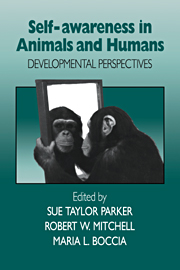Book contents
- Frontmatter
- Contents
- Contributors
- Foreword, by Louis J. Moses
- Acknowledgments
- Note added in proof
- Part I Comparative and Developmental Approaches to Self-awareness
- Part II The Development of Self in Human Infants and Children
- Part III Self-awareness in Great Apes
- Part IV Mirrors and Monkeys, Dolphins, and Pigeons
- Part V Epilogue
- Author index
- Subject index
Foreword, by Louis J. Moses
Published online by Cambridge University Press: 24 November 2009
- Frontmatter
- Contents
- Contributors
- Foreword, by Louis J. Moses
- Acknowledgments
- Note added in proof
- Part I Comparative and Developmental Approaches to Self-awareness
- Part II The Development of Self in Human Infants and Children
- Part III Self-awareness in Great Apes
- Part IV Mirrors and Monkeys, Dolphins, and Pigeons
- Part V Epilogue
- Author index
- Subject index
Summary
Big questions are back on the agenda in the cognitive sciences. We are seeing a renewal of interest in the very nature of subjective experience. Once-suspect notions like consciousness, awareness, meaning, and mind are again being pursued with some vigor. Consciousness, for example, is now variously being “rediscovered” (Searle, 1992), “reconsidered” (Flanagan, 1992), and even “explained” (Dennett, 1991). At the heart of this resurgent enterprise are questions of self and self-awareness. If we are ever to understand psychological experience we will need to grapple with questions concerning the subject of that experience. What is a self? Does it have real, tangible status or is it perhaps a mere cognitive or cultural construction that conveniently lends coherence to what would otherwise be quite disparate aspects of experience? What is the structure of the self? Is it unitary or multifaceted? If multifaceted, what are these facets and do they cohere in some organized fashion? What difference does self-awareness make? Does it have verifiable consequences for the psychological and behavioral life of an individual? It is questions of this order that have captured the interest of the various contributors to this volume. Their collective approach to studying the self is an especially fascinating one, focusing on the emergence of a sense of self from two perspectives.
- Type
- Chapter
- Information
- Self-Awareness in Animals and HumansDevelopmental Perspectives, pp. x - xviPublisher: Cambridge University PressPrint publication year: 1994
- 1
- Cited by



